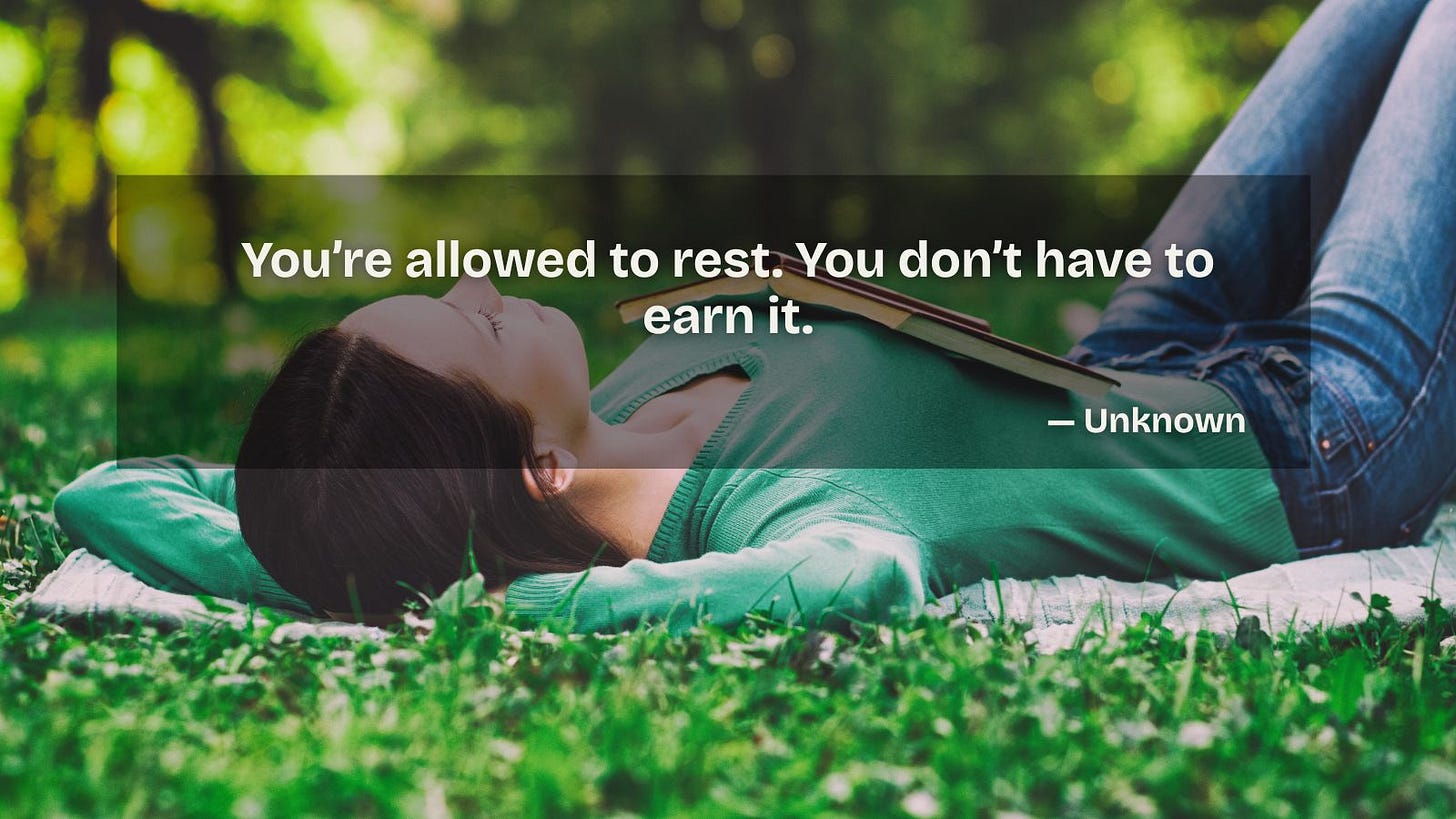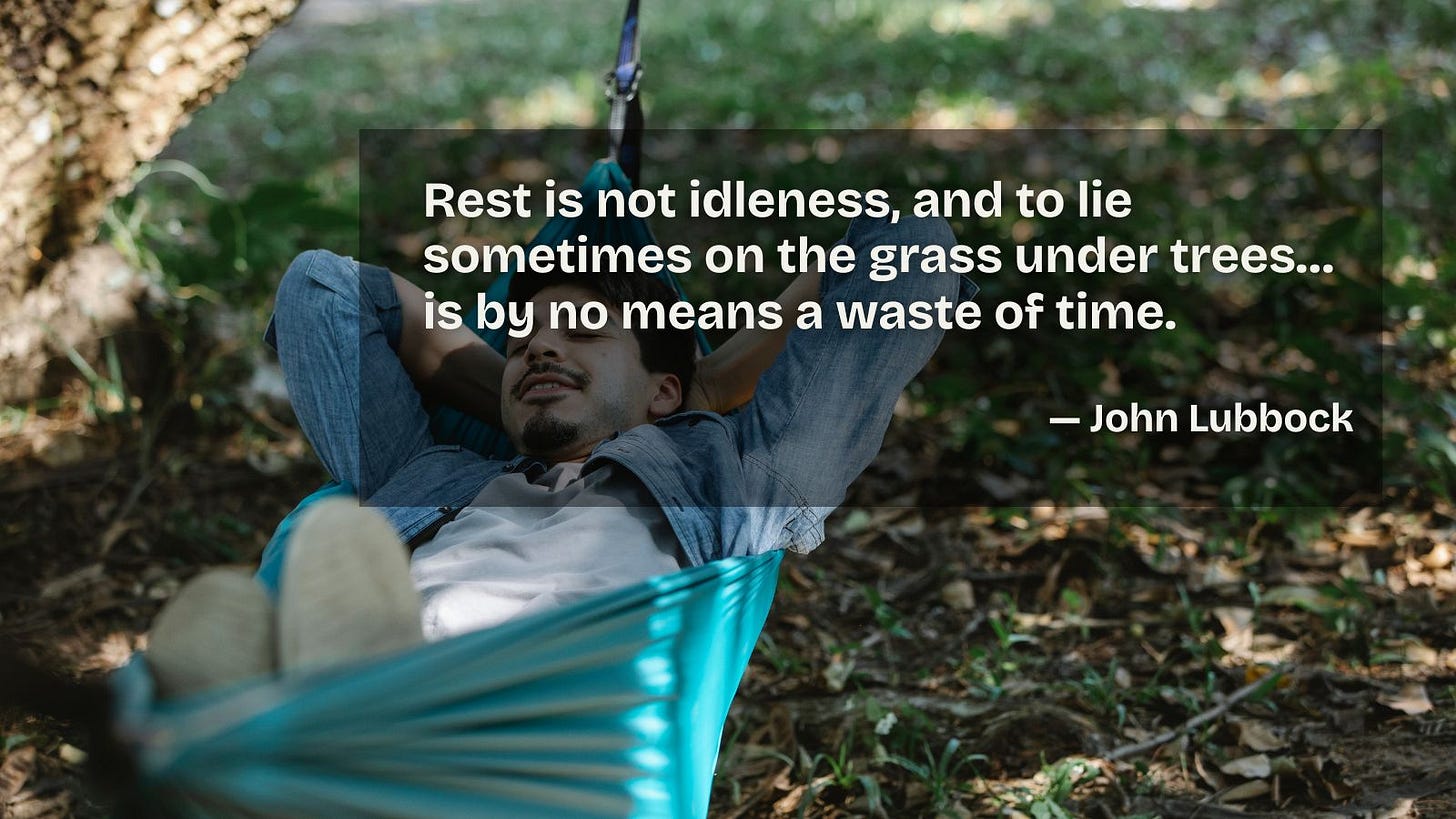Rest Is a Strategy
You’re not falling behind. You’re tired. There’s a difference.
I remember the week I mistook burnout for ambition. Last October, I was up by 5:30 a.m. each day, chugging coffee I didn’t have time to taste. By mid-afternoon, I had bulldozed my to-do list and felt a flicker of pride.
What I didn’t notice was how my chest tightened on the stairs to my home office, or how I stared through dinner like a ghost. I told myself I was locked in. By Friday, I couldn’t form a sentence on a client call. My brain felt packed with wet cotton, and my body was fried.
Turns out, my hustle had backfired.
It’s easy to see rest as a threat to progress, like stepping away means giving up ground. But the data says otherwise. A 2018 Harvard Business Review study found that employees who took regular breaks were 13% more productive than those who powered through without pausing.
Rest isn’t indulgent. It’s tactical. It sharpens focus, boosts creativity, and makes your brain usable again. Whether it’s a walk, a nap, or a weekend offline, real rest restores the capacity to think clearly.
I started small. I blocked off a “power hour” from 2:30 to 3:30 p.m. daily. No meetings, no deadlines. Sometimes I took a 20-minute nap, then stretched for ten. Other times, I sat on my balcony and watched birds fly loops over the power lines.
At first, I felt guilty. A voice in my head hissed that I should be writing, posting, replying. But a strange thing happened. After that hour, I came back to my desk with better ideas and a steadier mood. Projects that felt thorny in the morning unfolded easily. Emails that dragged on for an hour took 20 minutes flat.
Try This: Schedule Micro-Rests
Block three 15-minute breaks into your calendar—morning, midday, and late afternoon. Treat them like non-negotiable meetings. During those breaks:
Silence notifications. Close email. Hit “Do Not Disturb.”
Do something low-stakes: a quick walk, five minutes of meditation, or sit with your eyes closed.
Before jumping back in, jot down one thought: What’s next? or How do I feel? It resets your focus.
It might feel odd at first, especially if you're knee-deep in work. But a 2017 NIH report found that short, intentional breaks during mentally demanding tasks reduced fatigue by 30%. Even a few quiet breaths can clear the mental fog.
But let’s go deeper. Rest isn’t just about carving out breaks. It’s about unpacking why you resist them in the first place. In therapy last summer, I realized I had internalized a belief that rest = laziness. I’d learned it early on, in places where “success” meant KPIs, Slack pings, and caffeine-fueled output. Rest was for the weak.
I carried that story into adulthood until I saw how much it was costing me.
Closing Thought
Rest isn’t weakness. It isn’t laziness or luxury. It’s a sharp, calculated move.
Start small. Protect your pauses. Your future self won’t just thank you. They’ll be sharper, faster, and a whole lot less crispy.
Journaling Prompt: Rewriting Your Rest Narrative
Take ten minutes and respond to this:
Think of a time when you felt proud of stepping back. What did you do, and what did that rest help you notice? How would your life change if rest were a requirement, not an afterthought?
Watch what comes up. Maybe part of you still fears falling behind. Or maybe you think suffering proves commitment. Let those thoughts surface. You don’t have to believe them forever.
In the last six months, everything shifted. I finish work at 6 p.m. sharp. I scan my to-dos for the next day, then close my laptop for good. Twice a month, I take digital-free Sundays. No pings, no screens. Just birds and, occasionally, my cat demanding dinner.
I don’t finish every task. But I finish the day with my mind intact—and that’s worth more.
References
Harvard Business Review. (2018). The Productivity Benefits of Taking Breaks.
National Institutes of Health. (2017). Effects of Micro-Breaks on Mental Fatigue.
Hit reply. I’d love to hear what you’re honoring this week.





Thank you for this powerful reminder that rest is not a sign of weakness, but a strategic act of self-preservation. I’m grateful for the vulnerability (I also write about how vulnerability makes someone a stronger leader) and wisdom you shared; it encourages a healthier, more sustainable path to doing great work. Here's to protecting our pauses and rewriting the narrative around rest.
I'm resting the bottoms of my feet today otherwise I'd be walking to the public library to continue working. But my feet, the bottoms of my feet, burn from loose-fitting shoes (or I should say slippers) that are not appropriate for walking causing a lot of blistering.